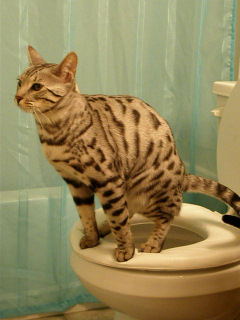Avoid Toilet Disasters: Don't Flush Cat Poop Down Your Toilet - Expert Guidance
Avoid Toilet Disasters: Don't Flush Cat Poop Down Your Toilet - Expert Guidance
Blog Article
What are your opinions regarding Can You Flush Cat Poop Down The Toilet??

Introduction
As feline owners, it's vital to be mindful of how we deal with our feline pals' waste. While it might appear hassle-free to purge feline poop down the commode, this technique can have damaging effects for both the setting and human health.
Environmental Impact
Purging cat poop introduces dangerous virus and bloodsuckers right into the supply of water, posturing a considerable danger to water environments. These pollutants can negatively affect marine life and compromise water quality.
Health and wellness Risks
Along with ecological issues, purging cat waste can also posture health threats to human beings. Pet cat feces might have Toxoplasma gondii, a bloodsucker that can cause toxoplasmosis-- a possibly extreme illness, especially for expectant women and individuals with weakened body immune systems.
Alternatives to Flushing
Fortunately, there are much safer and extra responsible means to throw away feline poop. Take into consideration the following options:
1. Scoop and Dispose in Trash
The most common approach of getting rid of feline poop is to scoop it into a biodegradable bag and toss it in the garbage. Be sure to use a committed trash inside story and get rid of the waste promptly.
2. Use Biodegradable Litter
Choose eco-friendly pet cat trash made from materials such as corn or wheat. These litters are environmentally friendly and can be safely dealt with in the garbage.
3. Bury in the Yard
If you have a lawn, think about burying pet cat waste in a designated area away from vegetable gardens and water sources. Be sure to dig deep sufficient to stop contamination of groundwater.
4. Set Up a Pet Waste Disposal System
Buy a pet garbage disposal system especially developed for pet cat waste. These systems make use of enzymes to break down the waste, minimizing smell and environmental influence.
Final thought
Accountable family pet ownership extends past providing food and shelter-- it also includes proper waste management. By refraining from flushing feline poop down the toilet and opting for alternative disposal methods, we can lessen our environmental impact and shield human health.
Why Can’t I Flush Cat Poop?
It Spreads a Parasite
Cats are frequently infected with a parasite called toxoplasma gondii. The parasite causes an infection called toxoplasmosis. It is usually harmless to cats. The parasite only uses cat poop as a host for its eggs. Otherwise, the cat’s immune system usually keeps the infection at low enough levels to maintain its own health. But it does not stop the develop of eggs. These eggs are tiny and surprisingly tough. They may survive for a year before they begin to grow. But that’s the problem.
Our wastewater system is not designed to deal with toxoplasmosis eggs. Instead, most eggs will flush from your toilet into sewers and wastewater management plants. After the sewage is treated for many other harmful things in it, it is typically released into local rivers, lakes, or oceans. Here, the toxoplasmosis eggs can find new hosts, including starfish, crabs, otters, and many other wildlife. For many, this is a significant risk to their health. Toxoplasmosis can also end up infecting water sources that are important for agriculture, which means our deer, pigs, and sheep can get infected too.
Is There Risk to Humans?
There can be a risk to human life from flushing cat poop down the toilet. If you do so, the parasites from your cat’s poop can end up in shellfish, game animals, or livestock. If this meat is then served raw or undercooked, the people who eat it can get sick.
In fact, according to the CDC, 40 million people in the United States are infected with toxoplasma gondii. They get it from exposure to infected seafood, or from some kind of cat poop contamination, like drinking from a stream that is contaminated or touching anything that has come into contact with cat poop. That includes just cleaning a cat litter box.
Most people who get infected with these parasites will not develop any symptoms. However, for pregnant women or for those with compromised immune systems, the parasite can cause severe health problems.
How to Handle Cat Poop
The best way to handle cat poop is actually to clean the box more often. The eggs that the parasite sheds will not become active until one to five days after the cat poops. That means that if you clean daily, you’re much less likely to come into direct contact with infectious eggs.
That said, always dispose of cat poop in the garbage and not down the toilet. Wash your hands before and after you clean the litter box, and bring the bag of poop right outside to your garbage bins.
https://trenchlesssolutionsusa.com/why-cant-i-flush-cat-poop/

As a fervent reader on How to Dispose of Cat Poop and Litter Without Plastic Bags, I figured sharing that topic was a smart idea. In case you enjoyed reading our blog posting kindly remember to pass it around. Thank you for your time invested reading it.
Call Today Report this page